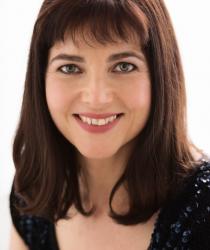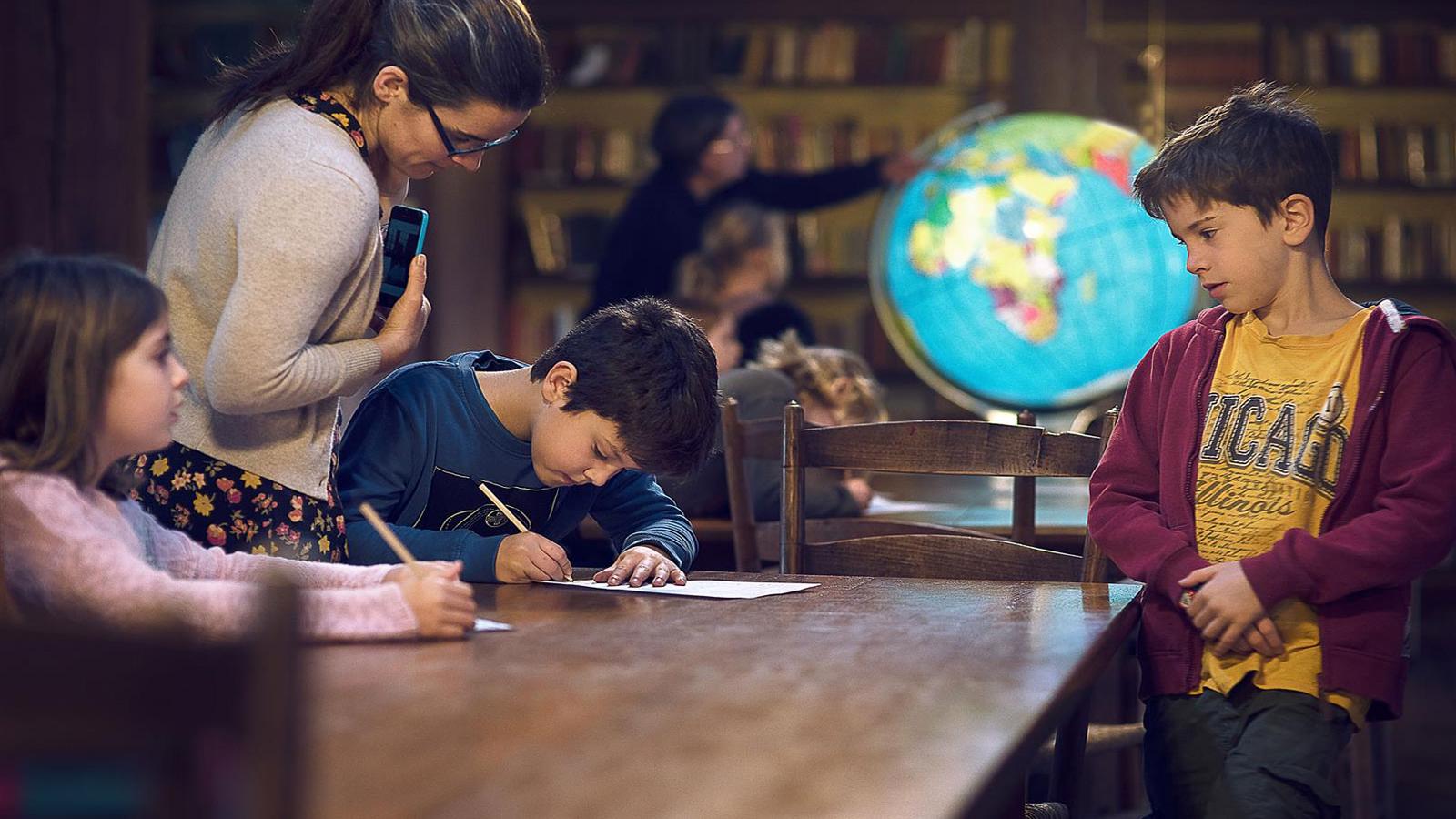
From her earliest years, music was a vital element of Clare McCaldin’s life. Her father, a professor of music, was one of her great influences and supporters, but his position at Lancaster University meant that Clare’s early school days at a comprehensive school in Morecambe were far from ideal for a sensitive, academic child. Bedales appeared to provide an excellent alternative for the budding singer and cellist, who duly landed a music scholarship and joined the school at the beginning of Block 2.
“With the benefit of hindsight, it was odd timing and I found it difficult to break into the various friendship circles that had already been established in middle school,” Clare reflects. “As a people-pleasing first child, somewhat shy, I was astonished and quite intimidated by how fully formed my peers seemed to be. Everyone gave the impression of being so strong, so confident, so sure of themselves. Even the clothes that people wore were an active statement about them as individuals; I, on the other hand, had a shocking collection of stuff, which added to my feeling of shyness and so I took refuge in things such as basket-weaving, looking after the chickens – and music, of course.”
Clare’s mother was a talented amateur musician and music was embedded in the fabric of the family home. “To some extent, I think that I took it for granted,” Clare muses. “It almost took on the form of background colour, as opposed to a passion of choice, and it was a fair bit later in life that I had the Road to Damascus moment that showed me how deeply I cared for it. That said, Jonathan Willcocks was a great inspiration at Bedales and I was also lucky enough to have a wonderful cello teacher in Helen Verney. The encouragement to experiment as widely as possible was always there in areas such as folk and jazz, which I enjoyed, but classical music was what I knew best and that’s what I tended to focus on.”
An excellent student with a strong humanities leaning, Clare benefited greatly from her exposure to the teaching methods of a number of Bedales’ most celebrated names. “Being taught by John Batstone greatly enhanced our critical judgement,” she says, “and he always wanted us to ask questions and to inform ourselves about literature, particularly poetry. At the time, there was an anthology of poetry kicking around that had been put together by the English department, which was my first proper encounter with something that has gone on to play a very significant role in my life. I didn’t do History beyond O-Level and I only dabbled in German at A-Level but I would also mention Ruth Whiting and George Bird as major characters. I always think about George’s love of German lieder and Ruth as such an extraordinarily passionate teacher of her subject.”
She continued through Bedales as far as her Oxbridge exams but in her own mind, Clare never quite managed to overcome her inherent lack of confidence while she was there. “There was so much to enjoy but for some reason, I never felt 100% comfortable,” she says. “I loved the barn and John Rogers’s welcoming kitchen there; I’m sure that spending so much time there lay behind the fact, years later, that I was the only person in a production of Carmen prepared to hold a chicken on stage! I did a bit of acting, sang in various choirs, played in the orchestra and I was always struck by how creative the people around me actually were. I’m thinking of people like Eddie Hall and Simon Hitchens, who were my direct contemporaries, but that creativity was everywhere. It took me so long to digest the lessons of Bedales but I can now see that the creativity, the freedom and the tolerance of the school totally formed me. It was just that they took a while to emerge in the adult me.”
Despite her choral scholarship to Clare College, Cambridge, Clare had little idea about what her future might hold: “As far as I was concerned, I had three more years to decide while I was at university, where I read French and Italian before adding history of art to the mix. Cambridge was great – I did all the stuff that I hadn’t quite had the nerve to do at Bedales and I enjoyed it all until I got badly ill with ME in my final year. That kiboshed a few plans but I hauled myself through it, got a decent degree and the following year, I was taken on as a graduate trainee at the National Art Collections Fund, which is now known as the Art Fund. The idea was to attempt to keep important works of art in the UK, which allowed me, as a junior events and marketing person, to get an introduction to presenting policy in public.”
Temporarily, Clare had given up the singing that had figured so prominently in her first two decades. “My principal choral director at Cambridge and I had a huge falling out,” she explains. “I felt that I had been told that I had nothing to contribute and I hadn’t yet taken on board the Bedalian habit of being sceptical of authority, so I accepted it.” Clare accordingly spent two further years in arts administration, this time working in the private office of Lord Rothschild, before experiencing her first career epiphany: “I felt that I needed some sort of shape to what I was doing, which is why I joined J Walter Thompson (JWT) as an account manager, negotiating and controlling client relationships.”
During her years at JWT, Clare gingerly dipped her toe back into music, starting by singing with Sunday morning choirs around London. Gradually, a seed was planted that would suddenly burst forth into full flower during a business meeting. “The talk was ebbing and flowing for hours about the required colour for the dungarees on the cartoon characters in an ad that would last for 30 seconds,” she remembers. “It occurred to me that I had to act; I wanted to be a singer, I didn’t know whether that would be possible but it would be more of a gamble for me not to try and find out than it would be to stay in advertising. There was no denying how cautious I had been in my life up to that point but now I decided that if my attempt to be a professional singer was an abject failure that would be fine. At least I would have had a go.”
Clare duly found herself a teacher, changed from a soprano into a mezzo and re-established contact with a substantial cohort of her Cambridge contemporaries who were already making their livings from the profession. Her first big break arrived with an invitation to join the Extra Chorus at the Royal Opera House and she made her debut at the 2000 Salzburg Easter Festival as Un’Ancella in Simon Boccanegra. She has appeared regularly since then as a member of the Royal Opera Extra Chorus while taking on a number of the traditional lyric mezzo roles for smaller opera companies.
“As I went along, it was becoming clearer to me that there is a big issue for female opera singers,” Clare observes. “The ratio of female to male roles in opera is something like 1:8 and in a world where you’re either a star or a maid it was evident that there would eventually be an absence of roles for me to sing. I realised that if I wanted to change that, I would have to do something about it myself; I met a bunch of people who told me that they felt that I could make a success of commissioning new pieces for me to sing and I decided to set up my own company.”
McCaldin Arts (www.mccaldinarts.com) was founded in 2012 with the major intention of creating new work but a secondary desire to present the traditional song repertoire from a new perspective. “We have to be clever about the way in which we present this marvellous canon that we’ve inherited to people,” Clare believes. “If we do it well, it becomes a great hook for people to see me in something new and different. The thing is that audiences love stories. Both the new pieces that I’ve commissioned and the recitals I write and narrate have had great stories to attach to the music.”
Three solo shows have been major highlights of Clare’s five years as a singing entrepreneur: A Voice of One Delight (about the death of the poet Shelley); Haydn’s London Ladies (telling the story of Haydn’s girlfriends in London during the 1790s) and, most recently, Vivienne. This, her most acclaimed collaboration with Stephen McNeff, tells the story of TS Eliot’s first wife and was awarded five stars by the London Evening Standard. In September, Clare’s latest project, Over My Shoulder, will have its first performance; in this recital based on the lives of soprano Elisabeth Schumann and musical comedy star Jessie Matthews, Clare will narrate the remarkable life-stories of these two women and sing some of the music most closely associated with them. Meanwhile a new solo show about Queen Mary I and a chamber opera called The Ubiquitous Woman are also in development.
It has been an extraordinarily successful period in Clare’s life, a reward for her initiative and courage in taking a risk on the unknown. “I do feel that I’ve proved something to myself, that I’ve made the right decision and that I’ve been vindicated,” she says. “There was no way of guessing that it would turn out as well as it has but it has been so gratifying to uncover in myself an interest in creating, as well as being able to do my singing. Just as pleasing to me is the fact that I seem to have become something of a role model for younger musicians, who constantly ask me how I’ve managed to do my own thing in what is a very competitive world in which we can feel entirely dependent on the approval of those who have work to give or withhold. As an occasional guest lecturer at Oxford University, I get the chance to share my knowledge with a new generation so I feel very privileged.”
Clare’s ambitions for her work and her business remain undimmed. “I want to get it out to the widest possible audience,” she says. “There are obviously so many different companies and individuals who are doing what I do; what would be nice is to find that tipping point where I go from being one among a number to being at the top of mind for people in the business and audiences.”
It is ironic that the creativity that Clare always used to associate only with other people while she was at Bedales has now emerged so triumphantly from her in later life. “You know, in retrospect, I don’t think that I made the most of my opportunities at Bedales,” she admits. “I could have found so much more in common with the fantastic people who were there than I did at the time. Having said that, I realise now that what I learned there really did sink in. The lessons of Bedales may have taken time to digest but they definitely contributed to who and what I’ve become.”
Photo credit: Amanda Clarke
